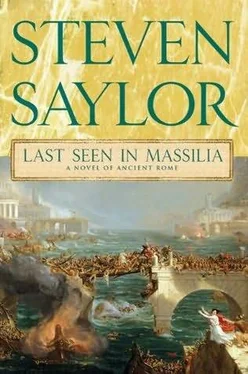Steven Saylor - Last seen in Massilia
Здесь есть возможность читать онлайн «Steven Saylor - Last seen in Massilia» весь текст электронной книги совершенно бесплатно (целиком полную версию без сокращений). В некоторых случаях можно слушать аудио, скачать через торрент в формате fb2 и присутствует краткое содержание. Жанр: Исторический детектив, на английском языке. Описание произведения, (предисловие) а так же отзывы посетителей доступны на портале библиотеки ЛибКат.
- Название:Last seen in Massilia
- Автор:
- Жанр:
- Год:неизвестен
- ISBN:нет данных
- Рейтинг книги:3 / 5. Голосов: 1
-
Избранное:Добавить в избранное
- Отзывы:
-
Ваша оценка:
- 60
- 1
- 2
- 3
- 4
- 5
Last seen in Massilia: краткое содержание, описание и аннотация
Предлагаем к чтению аннотацию, описание, краткое содержание или предисловие (зависит от того, что написал сам автор книги «Last seen in Massilia»). Если вы не нашли необходимую информацию о книге — напишите в комментариях, мы постараемся отыскать её.
Last seen in Massilia — читать онлайн бесплатно полную книгу (весь текст) целиком
Ниже представлен текст книги, разбитый по страницам. Система сохранения места последней прочитанной страницы, позволяет с удобством читать онлайн бесплатно книгу «Last seen in Massilia», без необходимости каждый раз заново искать на чём Вы остановились. Поставьте закладку, и сможете в любой момент перейти на страницу, на которой закончили чтение.
Интервал:
Закладка:
Arausio took her hand and squeezed it, but when she tried to look into his eyes he pulled at his mustache and turned his face away. "Wife, you mustn't raise your hopes. We both know what happened to Rindel. There's no use-"
"Perhaps this will be more conclusive." I held up the ring with the skystone.
The two of them gazed at it curiously but made no comment. "Did this belong to your daughter?"
"I never gave her such a ring," said Arausio.
"Not all rings given to a beautiful young woman are gifts from her father."
He frowned at the insinuation. "I never saw her wear it."
"Neither did I." His wife shook her head. She seemed fascinated by the stone, unable to take her eyes off it. "Why do you show it to us? Where does it come from?"
"It was found yesterday on the summit of the Sacrifice Rock." Arausio's face went blank for an instant, then became twisted with rage. "He gave it to her! The filthy swine! He thought he could placate her-flatter her, buy her silence-with a ring! She must have thrown it at his feet in disgust. And that's when he-"
His wife put a fist to her lips and sobbed. Arausio put his arms around her and shuddered, his features torn between fury and grief.
I was in no hurry to return to Apollonides's house. We walked aimlessly about the city. Davus saw no sign of our followers. "What do you think, Davus? If it wasn't Rindel we saw on the Sacrifice Rock, then perhaps it wasn't Zeno, either."
"Oh, no, it was Zeno we saw. And Rindel, too."
"What about the cloak she was wearing?"
He shrugged. "Maybe Rindel owned more than one such cloak, and her mother is confused. Or perhaps Rindel took her mother's cloak, and her mother simply hasn't noticed yet. It's a tiny detail."
"And the ring? Is it as Arausio said-Zeno tried to give her the ring as some sort of consolation, and when she refused it, he decided to put an end to her?"
"Not necessarily." Davus frowned. "I think Zeno must have given her the ring a long time ago, when they first became lovers."
"But her parents never saw it."
"She kept it a secret from them. That's what the ring was, a lovers' secret, shared just between her and Zeno."
"I see. And that's why she made a show of taking it off on the Sacrifice Rock-to spurn him in return?"
"Unless…" Davus furrowed his brow. "This is what I really think happened. It was Zeno who pulled the ring off her finger, against her will. I think that's why he was chasing her in the first place, to take back the ring."
"Why would he do that?"
"Who knows how the mind of such a fellow works? If the ring stood for a promise he'd made to Rindel before he spurned her, then as long as she possessed it, it was a reminder of his own lies and betrayal. Perhaps Rindel threatened to confront Cydimache with it, to flaunt the fact that Zeno really loved her, not his deformed wife."
"So taking the ring from her not only retrieved the tangible evidence of his pledge, it marked a break with the past." Davus nodded. "Once he'd done that, he found the nerve to push her off the rock and never look back."
I shook my head. "The man you're describing is a complete monster, Davus."
"Yes, he is."
We rounded a corner. I was so lost in thought that I didn't realize where we were, even when the smell of charred wood was suddenly strong in my nostrils. That smell was mixed with the less pleasant odor of ashes doused with seawater, and another smell, which only gradually I recognized as blood; not fresh blood, but blood spilled hours ago. Suddenly, we stood before the ruins of the scapegoat's house.
The site was littered with broken, charred beams, cracked roofing tiles, pools of black water, and heaps of smoldering ashes. Usually, in the ruins of a great house, one sees remnants of furnishings and decorations-metal lamp stands and marble statues will survive a fire-but in these ruins there were no such artifacts to be seen; before it went up in flames, the scapegoat's house had been picked clean by looters. Instead, poking up from the general debris were remnants of some of the looters themselves. Scattered amid the ruins were poles driven into the mud, and mounted on the sharpened, bloodstained poles were severed heads. I heard Davus murmur quietly and saw that he was moving his lips, counting.
"Eighteen," he whispered. There were as many woman as men among them; some looked hardly older than children.
The looters must have been beheaded on the spot, for at our feet were great pools of blood. Where it lay thin on the paving stones, the blood had dried to purple, almost black. Where it lay thickest, it appeared still moist and dark red. Elsewhere it had mingled with pools of sooty water, staining them deep crimson. Eighteen bodies contain a veritable lake of blood.
I turned my face away. I was ready to return to the house of Apollonides.
Suddenly, there was a sound like a thundercrack, followed by a loud rumbling noise. The earth shook. People in the street stopped in their tracks and fell silent.
The noise was not thunder; the sky above was blue and cloudless.
"Earthquake?" whispered Davus.
I shook my head. I turned to look in the direction of the city's main gate and pointed to a great white plume that rose into the air, billowing and growing higher as we watched.
"Smoke? From a fire?" said Davus.
"Not smoke. Dust. A great cloud of dust. From the rubble."
"Rubble? What's happened?"
"Let's go and see," I said; but with a thrill of intuition that made my heart pound in my chest, I knew exactly what had occurred.
XX
"Apollonides thought he was being so clever to dig that inner moat and fill it with water. He anticipated that Trebonius would attempt to tunnel beneath the section of wall nearest the city gate, and the moat was his solution. It worked, as you and I know all too well. When the sappers broke through, the tunnel was flooded and the men sent to take the gate were horribly drowned."
Davus and I had found a spot a little away from the crowd of spectators who thronged the main market square of Massilia. We were only a few steps from the very spot where we had pulled ourselves out of the water, where I had been abused by the old man Calamitos, and where Hieronymus had come to our rescue. That all seemed very long ago.
The day had begun to wane. The sun was lowering in the cloudless sky, casting long shadows.
Some of the spectators wailed and tore their hair. Some hung their heads and wept. Some stood in stony silence. Some simply stared at this latest, most terrible catastrophe to overtake their city, their eyes wide and their jaws open in disbelief.
A cordon of soldiers kept the crowd away from the frantically working engineers. A path was kept clear for the troops of archers and the teams of laborers who kept arriving from all parts of the city. By the hundreds they converged at this spot. The laborers were dispatched to take orders from the engineers. The archers were sent to the nearest bastion towers, where they scurried up the stairwells to take up posts at the already crowded battlements.
Nothing remained of the moat but a great morass of mud and muck, in which the engineers and their workers stamped about, shouting orders and forming lines to pass broken timbers and bits of rubble toward the gaping breach in the wall.
The breach was narrowest at the top, widest at the bottom. Where the battlement platform had fallen in, a man with long legs might, with luck, be able to jump across. Immediately below that point, the breach widened dramatically and continued to widen until it reached the base of the wall. The pile of debris formed by the collapsing blocks of limestone was considerable, but much too small to contain all the stones that had fallen.
One did not have to be Vitruvius to see what had happened. Over time, the flooded tunnel beneath the wall had created a sinkhole. In a single moment, the sinkhole had given way and had swallowed up the foundation, causing a considerable section of the wall above to collapse. The gaping sinkhole had swallowed much of the resulting debris, so that only a pile of rubble, hardly taller than a man, remained to be seen.
Читать дальшеИнтервал:
Закладка:
Похожие книги на «Last seen in Massilia»
Представляем Вашему вниманию похожие книги на «Last seen in Massilia» списком для выбора. Мы отобрали схожую по названию и смыслу литературу в надежде предоставить читателям больше вариантов отыскать новые, интересные, ещё непрочитанные произведения.
Обсуждение, отзывы о книге «Last seen in Massilia» и просто собственные мнения читателей. Оставьте ваши комментарии, напишите, что Вы думаете о произведении, его смысле или главных героях. Укажите что конкретно понравилось, а что нет, и почему Вы так считаете.










